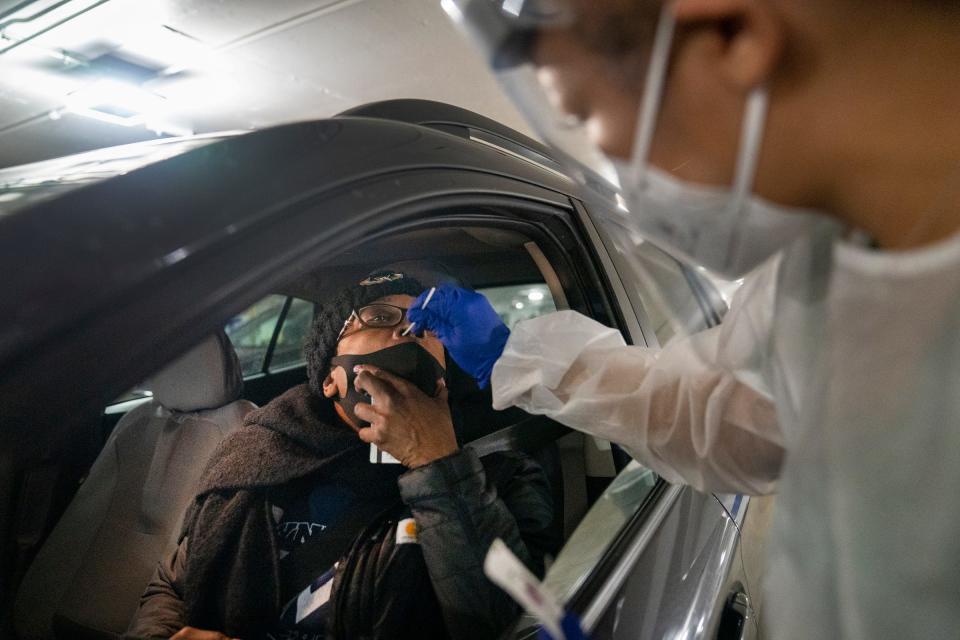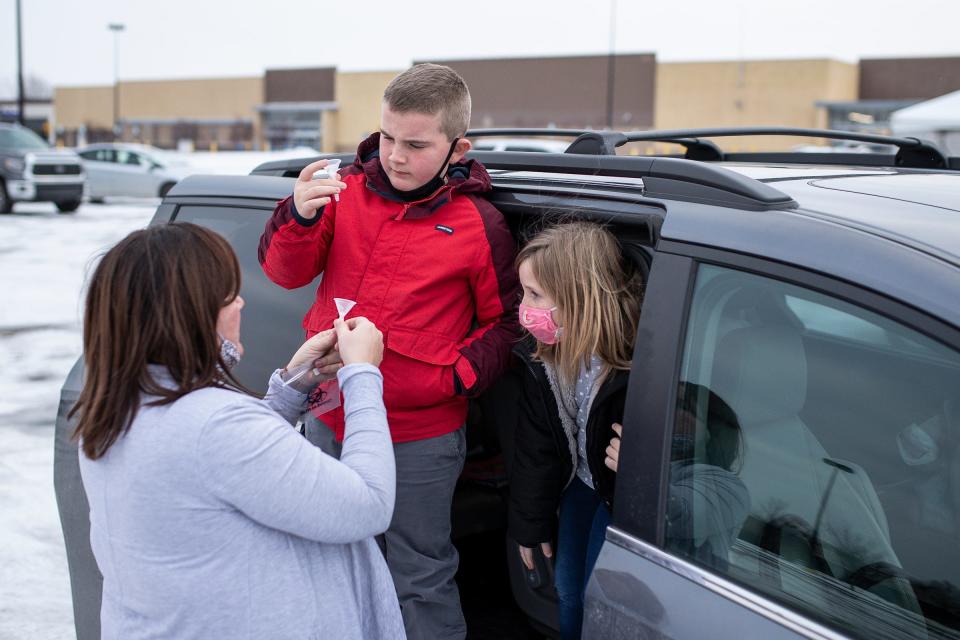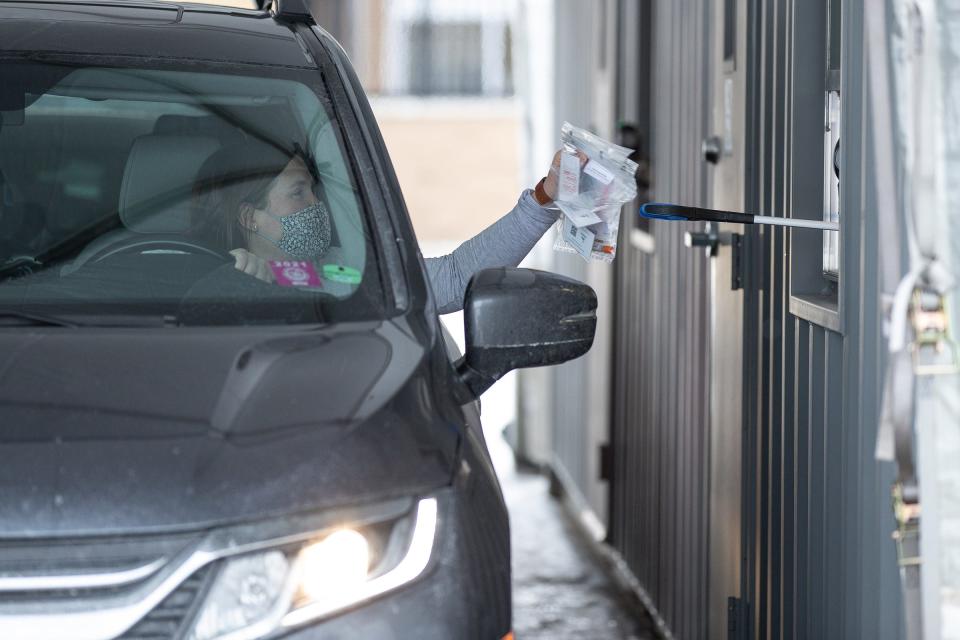Michigan contact tracing slows down: 'Folks need to just assume they've been exposed'
Coronavirus contact tracing has all but stopped for the vast majority of Michigan residents amid the worst yet pandemic surge.
That means no one is likely to tell you if you were exposed to someone who has tested positive for the virus, unless the person who's infected picks up the phone to let you know.
"We really wish we could contact everybody, but there always has been a plan that there's going to come a point where we're really going to need folks to take on personal responsibility as this shifts from a pandemic to something that's endemic, something that we're going to have to live with," said Nick Derusha, health officer of the Luce, Mackinac, Alger and Schoolcraft District Health Department and president of the Michigan Association for Local Public Health.

More: COVID-19 hospitalizations beginning to ease, Detroit-based Henry Ford Health says
More: Auditor: Not fair to say state underreported COVID-19 long-term care deaths
"Local public health is not going to be calling every case or calling every contact and folks are going to have to really understand the things that they're going to need to do in order to protect themselves, protect their families and their communities."
Instead, local health departments are prioritizing COVID-19 outbreak investigations and contact tracing for people who live in nursing homes or other long-term care facilities, shelters, group homes, prisons and jails and those who attend schools or live in dormitories.
"This redirection of public health resources to a focus on outbreak venues and clusters position limited resources to have the greatest impact," said Lynn Sutfin, a spokesperson for the state health department.
It's part of a shift in the strategy for handling the pandemic as thousands of new cases are reported daily, and the capacity to conduct contact tracing shrinks along with the people's willingness to cooperate.
On Wednesday, the seven-day average of new daily cases broke a pandemic high of 17,589 in Michigan. There simply are not enough local health department workers to conduct contact tracing for each person who's newly infected.
More: Michigan coronavirus cases: Tracking the pandemic
More: At-home COVID-19 test website is live a day early: How to order via USPS
"In times of high community spread, ... in indoor places where there will be people for any extended period of time without masks on — restaurants, bars, really in any crowded public settings — folks need to just assume they've been exposed," Derusha said.
A new report from the state health department shows that of more than 362,000 cases of the virus reported since December, just 4.4% — or about 15,900 infected people — provided the names of close contacts to health officials.
And of those who did, only 26.7% — or roughly 4,250 people — were successfully reached and told that they had been exposed to the virus.
"We continue to experience high numbers of individuals who do not respond when attempts are made by public health to contact them," Sutfin said.
Those who have been reached haven't always been kind or helpful, Derusha said. Often, contact tracers are met with anger and frustration. That was especially true during the fall delta variant surge.
"A lot of people that would yell or scream at us simply don't answer the phone," anymore, Derusha said. "They don't pick up. They don't talk to us. They don't tell us their contacts. They just ignore us."

To avoid that but still get the message out, Derusha said, "a lot of local public health departments ... have moved to automated systems, where we can send out text messages. Folks can reply to surveys via text, and they can respond that way. So it's not a phone call every time."
Now that local health departments have such limited capacity to contact people who've been exposed, Derusha said it's important that Michiganders follow the guidelines to slow the spread of the virus, such as:
Wearing a high-quality mask in indoor, public places
Avoiding large gatherings
Getting vaccinated and boosted when eligible
Getting tested if symptoms appear
Following isolation and quarantine recommendations
Calling close contacts if you test positive to tell them they've been exposed.
A close contact exposure is defined as anyone who has been within 6 feet of an infected person for 15 minutes or more from two days prior to symptom onset or a positive test, according to the state health department.
"It is important that persons that test positive for COVID-19 isolate and let their close contacts know they may have been exposed," Sutfin said. "If persons have been exposed, they should quarantine or watch for symptoms (depending on vaccination and recent COVID-positive status) and take other recommended steps, even if they don’t receive a call from the health department."
People can call the state's COVID-19 hotline at 888-535-6136 to discuss a coronavirus test result or get information on isolation/quarantine or go online to https://www.michigan.gov/coronavirus and click on "CONTAIN COVID" at the top of the page.
Gov. Gretchen Whitmer asked the state health department Thursday to ship out every coronavirus test kit the state has available to schools and other priority groups such as nursing homes, correctional facilities, first responders and local health departments to try to slow the spread of the virus.
That means 200,000 tests could be distributed immediately, with another 100,000 shipped out later this week.
More than a million free tests will be distributed to Michiganders this month, the state health department reported — the largest monthly allocation to date, and comes as the federal government also pledged to deliver up to four free tests to every household in the country who signs up through https://www.covidtests.gov.

More: Jeff Blashill: How reduced COVID-19 testing will affect Detroit Red Wings
More: Michigan attorney general issues consumer alert for COVID-19 test scams
“Antigen and over-the-counter tests allow Michiganders to very quickly determine if they are positive for the virus and take actions to isolate and seek treatment if needed,” said Elizabeth Hertel, director of the state health department, in a statement.
Also Thursday, the state health department issued an epidemic order requiring all Michigan nursing homes offer on-site COVID-19 vaccines to residents who are not up to date.
While it doesn't mandate that residents must take vaccines, it does require all nursing homes in the state to have on-site vaccinations available within 30 days.
“With the omicron variant rapidly spreading across our state and cases of COVID-19 continuing to remain high, we want to make sure our most vulnerable Michiganders are protected from the virus,” Hertel said.
Staff writer Christina Hall contributed to this report.
Contact Kristen Jordan Shamus: kshamus@freepress.com. Follow her on Twitter @kristenshamus.
This article originally appeared on Detroit Free Press: COVID-19 contact tracing all but stops in Michigan. Why it matters

